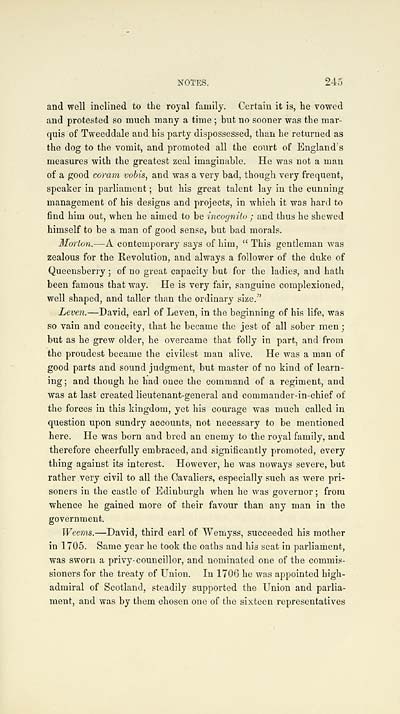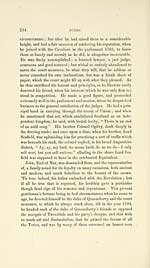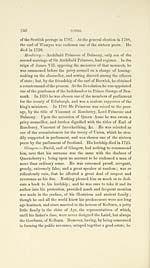Glen Collection of printed music > Printed music > Jacobite relics of Scotland > [First series]
(269) Page 245
Download files
Complete book:
Individual page:
Thumbnail gallery: Grid view | List view

NOTES. 245
and well inclined to the rojal family. Certain it is, he vowed
and protested so much many a time ; but no sooner was the mar-
quis of Tweeddale and his party dispossessed, than he returned as
the dog to the vomit, and promoted all the court of England's
measures with the greatest zeal imaginable. He was not a man
of a good coram vobis, and was a very bad, though very frequent,
speaker in parliament ; but his great talent lay in the cunning
management of his designs and projects, in which it was hard to
find him out, when he aimed to be incognito ; and thus he shewed
himself to be a man of good sense, but bad morals.
Morton. — A contemporary says of him, " This gentleman was
zealous for the Revolution, and always a follower of the duke of
Queensberry ; of no great capacity but for the ladies, and hath
been famous that way. He is very fair, sanguine complexioned,
well shaped, and taller than the ordinary size."
Leven. — David, earl of Leven, in the beginning of his life, was
so vain and conceity, that he became the jest of all sober men ;
but as he grew older, he overcame that folly in part, and from
the proudest became the civilest man alive. He was a man of
good parts and sound judgment, but master of no kind of learn-
ing ; and though he had once the command of a regiment, and
was at last created lieutenant-general and commander-in-chief of
the forces in this kingdom, yet his courage was much called in
question upon sundry accounts, not necessary to be mentioned
here. He was born and bred an enemy to the royal family, and
therefore cheerfully embraced, and significantly promoted, every
thing against its interest. However, he was noways severe, but
rather very civil to all the Cavaliers, especially such as were pri-
soners in the castle of Edinburgh when he was governor ; from
whence he gained more of their favour than any man in the
government.
Weems. — David, third earl of Wemyss, succeeded his mother
in 1705. Same year he took the oaths and his seat in parliament,
was sworn a privy-councillor, and nominated one of the commis-
sioners for the treaty of Union. In 1706 he was appointed high-
admiral of Scotland, steadily supported the Union and parlia-
ment, and was by them chosen one of the sixteen representatives
and well inclined to the rojal family. Certain it is, he vowed
and protested so much many a time ; but no sooner was the mar-
quis of Tweeddale and his party dispossessed, than he returned as
the dog to the vomit, and promoted all the court of England's
measures with the greatest zeal imaginable. He was not a man
of a good coram vobis, and was a very bad, though very frequent,
speaker in parliament ; but his great talent lay in the cunning
management of his designs and projects, in which it was hard to
find him out, when he aimed to be incognito ; and thus he shewed
himself to be a man of good sense, but bad morals.
Morton. — A contemporary says of him, " This gentleman was
zealous for the Revolution, and always a follower of the duke of
Queensberry ; of no great capacity but for the ladies, and hath
been famous that way. He is very fair, sanguine complexioned,
well shaped, and taller than the ordinary size."
Leven. — David, earl of Leven, in the beginning of his life, was
so vain and conceity, that he became the jest of all sober men ;
but as he grew older, he overcame that folly in part, and from
the proudest became the civilest man alive. He was a man of
good parts and sound judgment, but master of no kind of learn-
ing ; and though he had once the command of a regiment, and
was at last created lieutenant-general and commander-in-chief of
the forces in this kingdom, yet his courage was much called in
question upon sundry accounts, not necessary to be mentioned
here. He was born and bred an enemy to the royal family, and
therefore cheerfully embraced, and significantly promoted, every
thing against its interest. However, he was noways severe, but
rather very civil to all the Cavaliers, especially such as were pri-
soners in the castle of Edinburgh when he was governor ; from
whence he gained more of their favour than any man in the
government.
Weems. — David, third earl of Wemyss, succeeded his mother
in 1705. Same year he took the oaths and his seat in parliament,
was sworn a privy-councillor, and nominated one of the commis-
sioners for the treaty of Union. In 1706 he was appointed high-
admiral of Scotland, steadily supported the Union and parlia-
ment, and was by them chosen one of the sixteen representatives
Set display mode to: Large image | Transcription
Images and transcriptions on this page, including medium image downloads, may be used under the Creative Commons Attribution 4.0 International Licence unless otherwise stated. ![]()
| Special collections of printed music > Glen Collection of printed music > Printed music > Jacobite relics of Scotland > [First series] > (269) Page 245 |
|---|
| Permanent URL | https://digital.nls.uk/91270027 |
|---|
| Shelfmark | Glen.194 |
|---|---|
| Additional NLS resources: | |
| Attribution and copyright: |
|
| Description | Being the songs, airs, and legends, of the adherents to the house of Stuart. Collected and illustrated by James Hogg. Edinburgh: Printed for William Blackwood, 1819-1821. [First series] -- second series. |
|---|---|
| Shelfmark | Glen.194-194a |
| Description | Scottish songs and music of the 18th and early 19th centuries, including music for the Highland bagpipe. These are selected items from the collection of John Glen (1833 to 1904). Also includes a few manuscripts, some treatises, and other books on the subject. |
|---|
| Description | The Glen Collection and the Inglis Collection represent mainly 18th and 19th century Scottish music, including Scottish songs. The collections of Berlioz and Verdi collected by bibliographer Cecil Hopkinson contain contemporary and later editions of the works of the two composers Berlioz and Verdi. |
|---|

